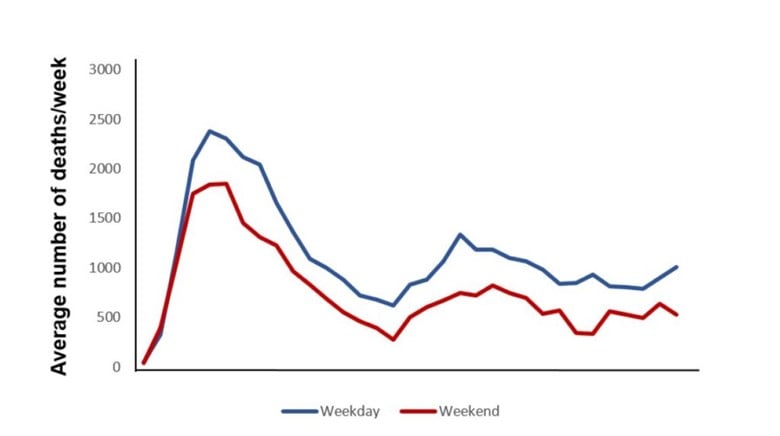A: TL, DR: The weekly pattern of fewer COVID-19 cases and deaths on the weekends is primarily due to differences in testing timing and reporting delays, but some of the pattern may be due to increased weekend socializing.
Based on publicly available data, there is a widely observed ‘weekend effect’ with fewer COVID-19 cases and deaths being reported on Saturday through Monday. In the US, new cases tend to peak on Friday and deaths peak on Tuesday/Wednesday. Similar weekly cycles occur in many other countries.
Much of this weekly cycle is due to differences in testing timing, backlogs, and reporting lags (see points 1-3 below), but a recent study using date-authenticated data found that there are in fact weekday upticks in new cases (but not deaths). This recent study suggests that there is a true weekly cycle for when people are getting sick (see point 4).
Here’s our broad breakdown of the sources of the weekly pattern for cases.
1.) Fewer patients get tested on the weekends: With shorter hours and fewer testing sites and doctors’ offices open, there are generally fewer tests on the weekend. In addition, patients often seek out care on weekdays even if they started feeling symptoms on the weekend. (Side note: This pattern is not surprising. Even in the beforetimes, researchers have long noted that Emergency Room utilization is higher on Mondays and lower on weekends.)
2.) Labs process fewer tests on weekends: Laboratories need staff to process the tests and then to report them to their health departments. Backlogs can accrue over the weekend and holidays when fewer people are working.
3.) Health departments have reporting lags on weekends: Health departments also need staff to report their results to the public. During periods of high volume, there are often backlogs and delays in reporting over weekends and holidays. For example, over the Thanksgiving holiday, there were many states that didn’t report at all, and results came in a few days later.
4.) Weekend gatherings lead to more initial symptoms on weekdays: Increased social mixing outside of workplace and households often occurs on the weekends, which may lead to symptomatic infections 4-5 days later.
As noted above, the study that looked at date-authenticated death data found that there’s less evidence that deaths are occurring more commonly on certain days of the week. Thus, the explanation for the weekly cycles in death that are observed in any public data are due to reporting lags. That is, deaths are more likely to REPORTED on weekdays, but they are not more likely to occur on weekdays.
Data Pro Tip: We recommend that you use a 7-day rolling average to get a sense of trends over time, rather than looking at daily numbers.
Image credit from this article, using Worldometers data (from March through October 2020)
Article on weekly cycles in Emergency Rooms



